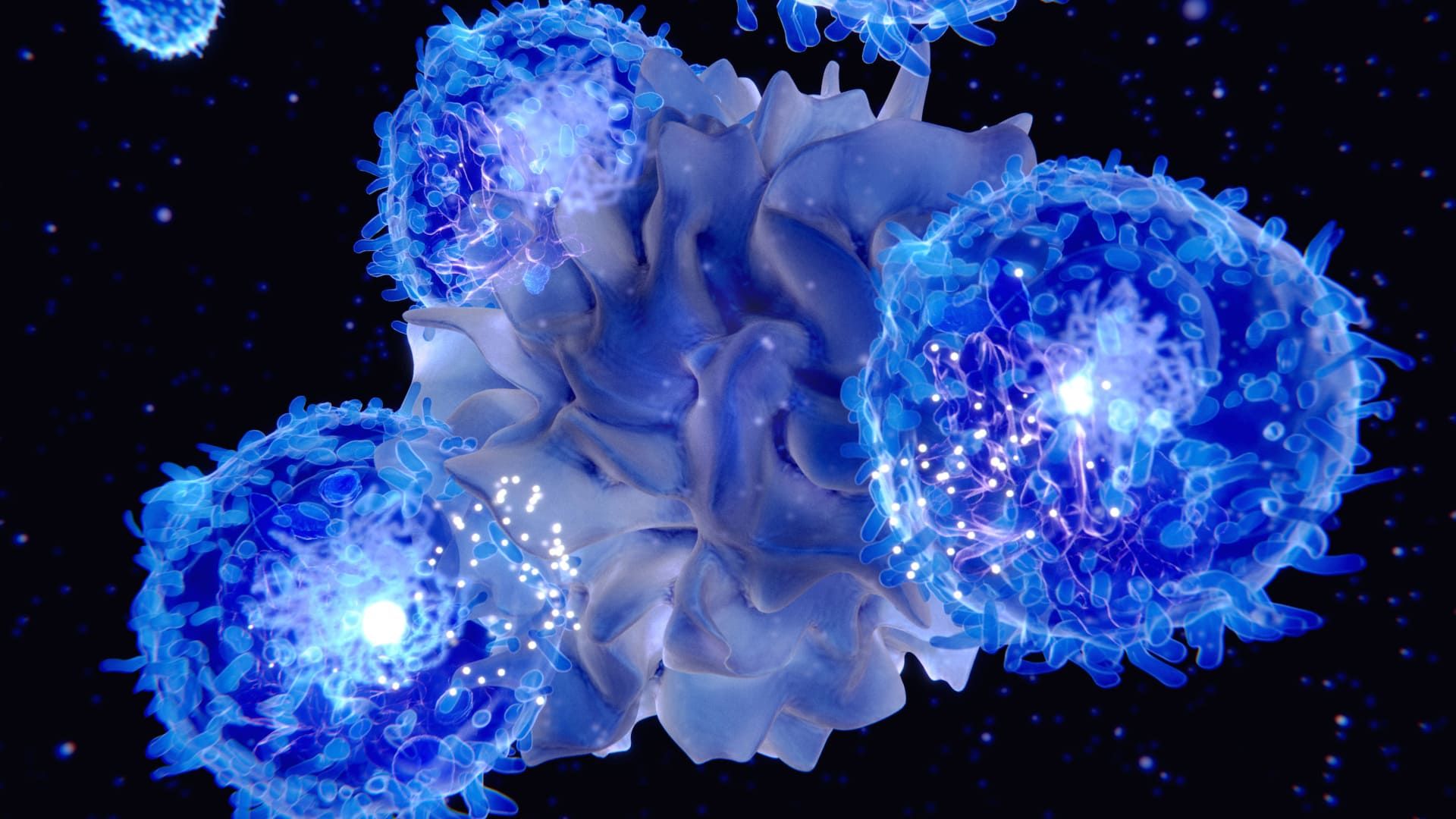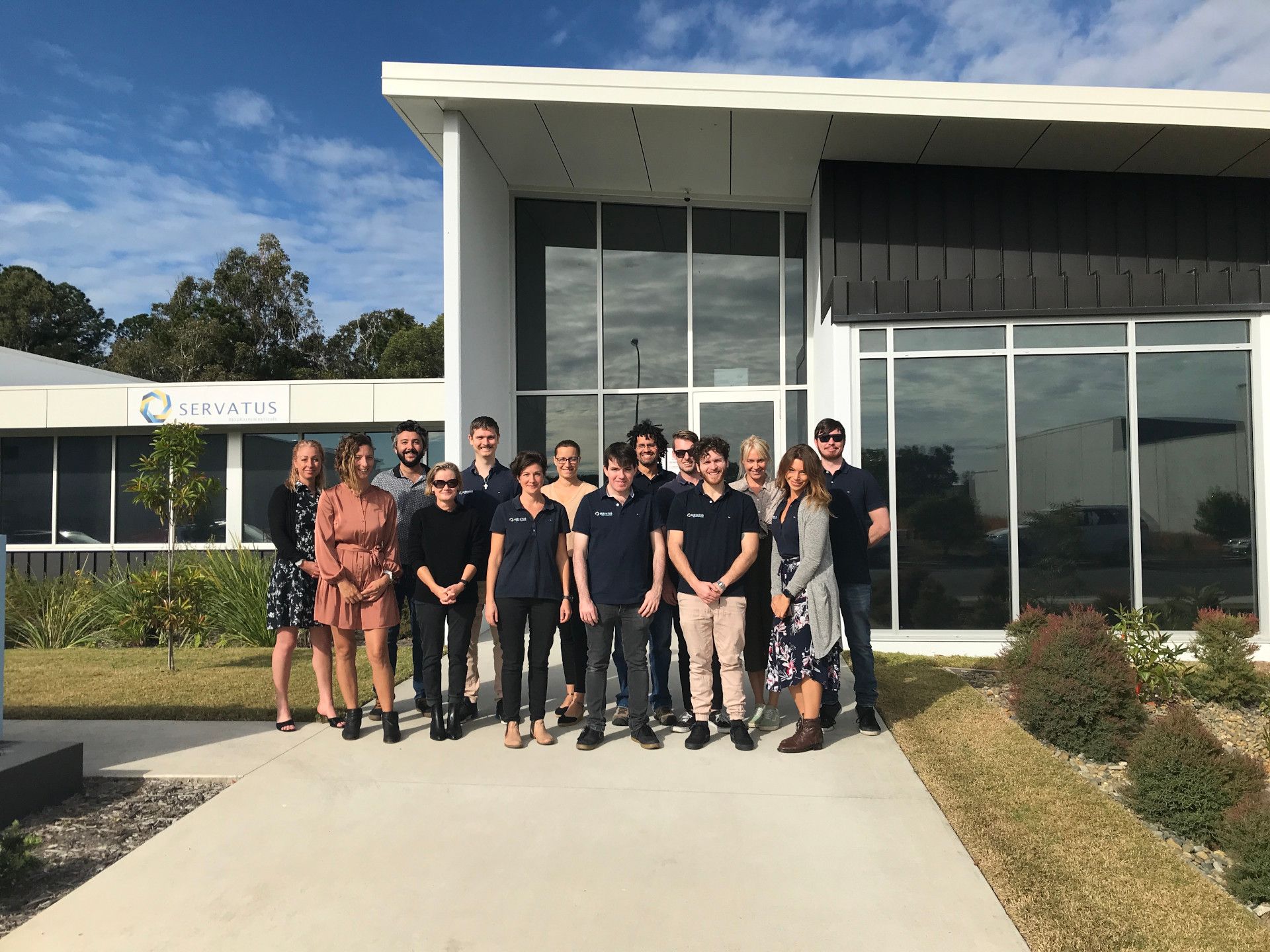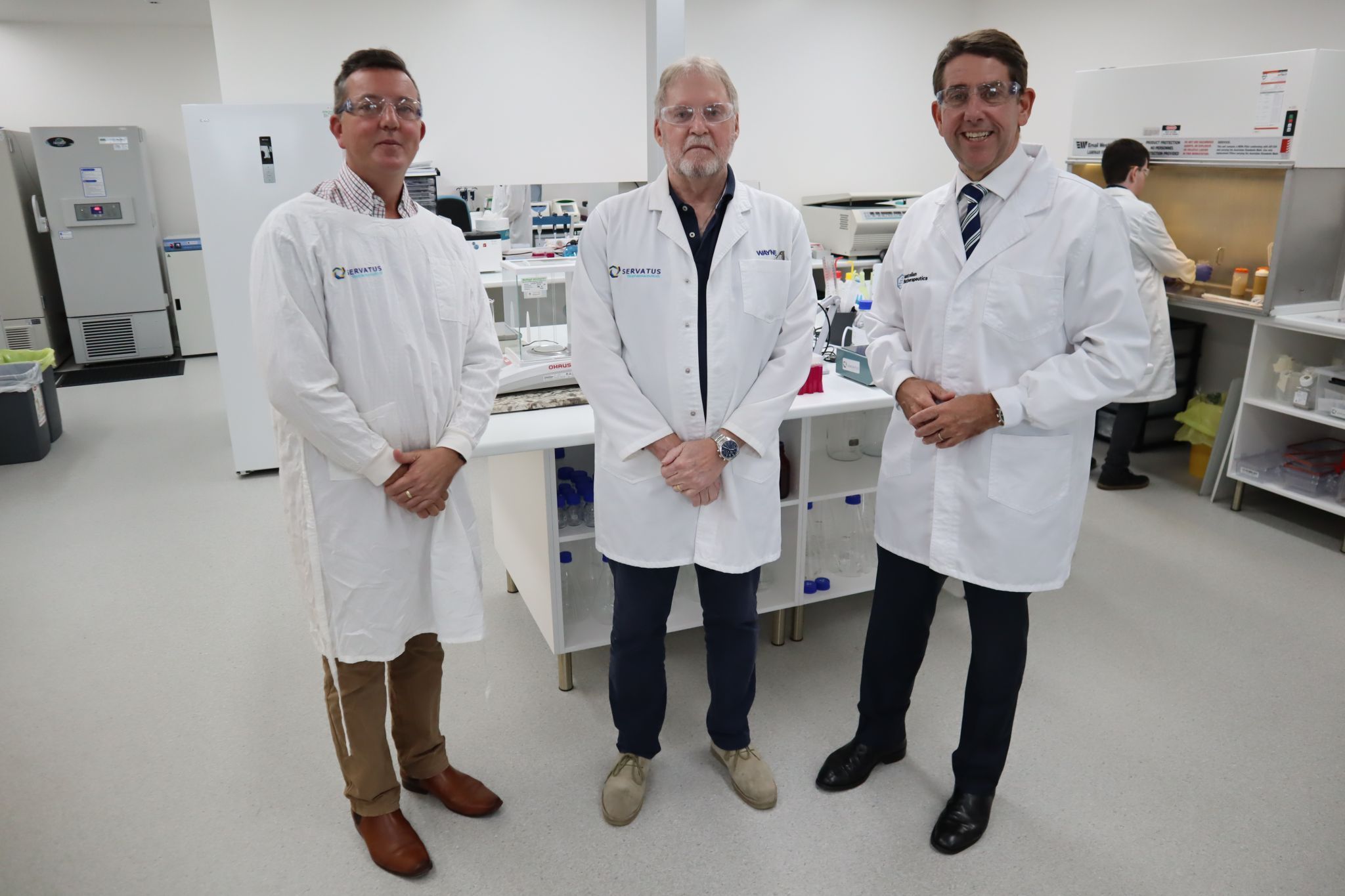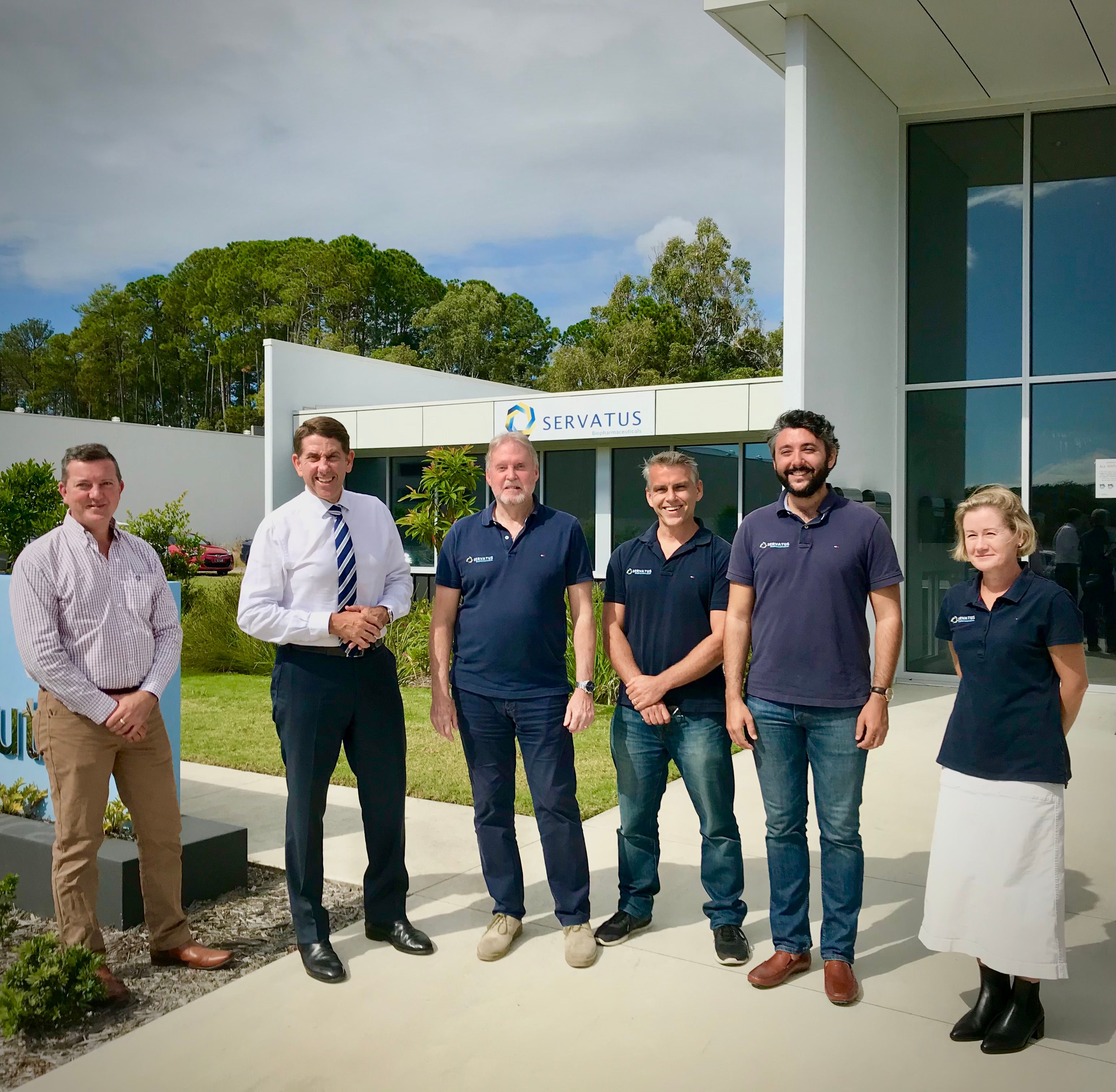

Servatus and Genetic Analysis enter Strategic Collaboration Agreement to develop new microbiome diagnostic and therapeutic solutions.
Microbiome DX company Genetic Analysis AS (“GA”) and Servatus Biopharmaceuticals Ltd (“Servatus”), have entered a Strategic Collaboration Agreement to combine their respective expertise to further advance the microbiome diagnostics and therapeutics markets. The collaboration will bring together Servatus’ world class knowledge of biotherapeutics and GA’s microbiome diagnostic signature analysis to develop new diagnostic markers and treatment options to ultimately improve the lives of patients worldwide.
The human microbiome market is anticipated to experience considerable growth on the back of the development of microbiome altering drugs and new diagnostics. Latest forecasts suggest the global human microbiome market to grow at a rate of 22.5% over the period 2022 to 2029, reaching USD 965.6 million by 2029*.
In the first stage of the collaboration, Servatus will establish a ‘GA-map® Flagship Lab’ at its Queensland manufacturing facility, Australian Biotherapeutics. The Lab will implement the GA-map® Technology platform and be fully operational to supply in-house and external microbiome analysis in the research field. This technology platform includes the GA-map® Dysbiosis Test, the first CE-marked IVD test on the market that provides microbiota profiles and dysbiosis status for IBS and IBD patients.
Servatus will also be able to utilize GAs extensive bioinformatical resources and the HumGut database, a novel comprehensive human gut genome collection, as well as the GA biobank with data from global healthy and diseased populations. By combining this with Servatus’ leading expertise in developing new microbial-based biotherapeutic drugs for a range of chronic diseases and conditions, and its immense clinical and research network, both parties expect to develop new treatment regimens as a result of the collaboration.
CEO of Servatus, Wayne Finlayson comments:
“We are thrilled to collaborate with Genetic Analysis, a pioneer for science-based diagnostics, research and product development in the human microbiome field. This strategic collaboration agreement will facilitate extensive knowledge sharing and enable us to establish the framework for shaping the global microbiome market as industry leaders. The partnership will leverage significant datasets provided by GA and utilize our Australian Biotherapeutics manufacturing facility to grow our business in Australia, Asia and the US. We look forward to providing further updates on our progress as we accelerate a significant international expansion over the coming months.”
CEO Ronny Hermansen comments:
“We are delighted to be partnering with Servatus. This collaboration will let the two companies draw on their combined world class expertise in both drug development, biosimilar manufacturing and microbiome analysis to accelerate the growth for both companies in delivering new innovative microbiome based therapies. Therapeutics and companion diagnostic solution’s that will improve patients’ lives globally. A key objective for GA is to collaborate with Pharma and to prepare for geographical expansion towards major markets and this collaboration agreement with Servatus is well in line with GA’s objectives communicated in the IPO and so this represents a major milestone in the company’s development.”
*Databridge Market Research, Human Microbiome Market report, 2022
For more information on Genetic Analysis, please contact:
Ronny Hermansen, CEO
E-mail: rh@genetic-analysis.com
About Genetic Analysis
Genetic Analysis AS (GA) is a science-based diagnostic company and pioneer in the human microbiome field with more than 10 years of expertise in research and product development. The unique GA-map® platform is based on a pre-targeted multiplex approach specialized for simultaneous analysis of a large number of bacteria in one reaction. The test results are generated by utilizing the clinically validated cutting edge GA-map® software algorithm. This enables immediate results without the need for further bioinformatics work. GA’s vision is to become the leading company for standardized gut microbiota testing worldwide, and GA is committed to help unlocking and restoring the human microbiome through its state-of-the-art technology. GA employs 24 highly qualified employees with relevant scientific backgrounds and with competence in bioinformatics, molecular biology, and bioengineering.
More info at Genetic Analysis website: www.genetic-analysis.com
Servatus strengthens Board with appointment of biopharmaceutical division head at Boehringer Ingelheim, Dr Uwe Buecheler
Servatus Limited, an Australian biopharmaceutical company delivering leading novel autoimmune and microbiome therapies, is pleased to announce the appointment of Dr Uwe Buecheler to its Board as Non-Executive Director. Dr Buecheler is a leading molecular biologist with more than 30 years of biopharmaceuticals experience at Boehringer Ingelheim in Germany. Boehringer Ingelheim is one of the world's leading pharmaceutical companies and the largest private pharmaceutical company, with annual revenues exceeding USD17bn and more than 50,000 employees.
Dr Uwe Buecheler’s appointment brings significant commercial and scientific experience to the Servatus Board at a time when the company is bolstering its Australian research and development capabilities for market-leading live biotherapeutic programs, including clinical trials for IBS-C, insomnia, rheumatoid arthritis and other health problems associated with the gut-microbiome-brain axis.
Dr Buecheler serves as Senior Advisor Biopharmaceuticals to the Board of Management Directors of Boehringer Ingelheim, having joined the Company in 1991. During his time at Boehringer Ingelheim, Dr Buecheler held a variety of senior roles across CMC development, Regulatory, Biosafety, Quality, and as Site Head and Lead for an expansion of Boehringer Ingelheim’s Global Operations Network in Europe, the US and China. He pioneered 1st Biologics MAH approval in Shanghai and played a key role in major expansion projects in aseptic processing, microbial manufacturing and large-scale mammalian cell culture operations. Dr Buecheler has overseen more than 30 Biologics approvals/launches, including more than five top 20 global biopharmaceuticals.
Dr Wayne Finlayson, CEO of Servatus commented: “We are thrilled to have Dr Uwe Buecheler join our Board as Non-Executive Director. Uwe brings extensive scientific and commercial leadership as well as invaluable experience in developing global biopharmaceutical operations. His appointment will significantly strengthen our Board capabilities and further complement the high calibre team Servatus has drawn from around the world as we look to advance development of our market-leading biotherapeutics programs. We hope to leverage Uwe’s vast knowledge and experience gained throughout his many years at Boehringer Ingelheim, one of the world’s top pharmaceutical companies, while expanding Servatus’ core business units over the next three years.”
Dr Uwe Buecheler said: “I am delighted to join Servatus’ Board during an exciting period of growth for the Company. Servatus is backed by a highly experienced and credible team that is at the forefront of microbial biotherapeutics and it is an honour for me to take up this opportunity to help contribute to the growth of Servatus during a pivotal time in the company’s history. I look forward to delivering on our objectives to maximise the global expansion capabilities of this leading business over the next three years and beyond.”
Dr Buecheler did his PhD in Molecular Biology at the University of Heidelberg and the Cancer Research Center in Heidelberg. He was awarded Professor h.c. at the University of Ulm and is a member of Advisory Boards of University´s and the Society for Biochemistry and Molecular Biology (GBM). In addition, he is Chairman of the Biopharma Cluster South Germany and is a member of several biopharmaceutical industry associations, including the international leadership forum of ISPE.
Clinical trial could prove gut health treatment doubles as insomnia cure
Researchers are actively recruiting for an Australian-first trial that is trying to find out if a gut microbiome treatment can help people with chronic insomnia.
The Sleep Disorders Centre at Brisbane’s Prince Charles Hospital is testing the efficacy of a specific therapy manufactured by Australian biotech company Servatus.
The centre’s director Deanne Curtin said that the field of treating the gut microbiome has been growing for a number of years, but much of the work has yet to be tested scientifically.
Dr Curtin said they hoped with this trial they would be able to confirm this treatment did have some benefit for people with clinical insomnia.
“We’re aware that there is a connection between the gut and the brain and sleep, so the idea of this treatment is that it may improve sleep by modulating inflammation and neurotransmitter production,” she said.
“It’s a fairly novel idea but we’re very interested to see what the outcome is.”
The treatment developed by Servatus is a mix of several strains of live bacteria which are known to be beneficial to gut health.
Company chief executive Wayne Finlayson said they had been selected for having various proven effects, including encouraging the natural production of neurotransmitters that help to regulate sleep patterns.
“We’ve been working on autoimmune disease for quite some time, on bacterial combinations to treat IBS and other inflammatory conditions,” Dr Finlayson said.
Read full article here
Our CEO Wayne Finlayson spoke with Joel Flynn at Proactive Investors about the first human study into Australian patients with clinically diagnosed insomnia using live biotherapeutics.
Our CEO Wayne Finlayson spoke with Joel Flynn at Proactive Investors about the first human study into Australian patients with clinically diagnosed insomnia using live biotherapeutics. The phase one and two clinical trial will run during 2022, with results expected in 2023. Close to 15% of the Australian population suffer from insomnia, with sleep disorders costing the economy and society around $51 billion annually.
Click here to read more.
Servatus Ltd is pleased to announce it has begun recruitment for its Phase I/II clinical trial for insomnia at the Sleep Disorders Centre at The Prince Charles Hospital in Queensland. This is the first study to research the effects of live biotherapeutics on patients with clinically diagnosed insomnia in Australia.
Servatus Ltd, an Australian biopharmaceutical company delivering leading novel autoimmune and microbiome therapies, is pleased to announce it has begun recruitment for its Phase I/II clinical trial for insomnia at the Sleep Disorders Centre at The Prince Charles Hospital in Queensland. This is the first study to research the effects of live biotherapeutics on patients with clinically diagnosed insomnia in Australia.
The study will examine the safety and efficacy of the treatment across 50 patients over a 35 Day treatment period, with the aim to assess the effect the live biotherapeutic has on gut microbiome composition and function and its association with healthy sleep patterns.
Dr Deanne Curtin, Sleep Disorders Centre Director at the Prince Charles Hospital said, “There is a definable gap in the development of safe and effective long-term solutions for insomnia. Improving sleep habits and behaviour therapy are typically the first approach in managing insomnia but most people do not seek professional support and may turn to over-the-counter medications to self-medicate. However, current medications, whether prescribed or over-the-counter are for short-term use only, may have undesirable side effects and do not treat the underlying cause.”
She continued, “To date, the role of the microbiome in sleep health has been under-recognised and under-researched. However, there is a link between the gut microbiome and sleep through modulating inflammation, regulating neurotransmitter synthesis and organising human circadian rhythm. That is why influencing the microbiome to a healthier composition could offer a promising new treatment option for insomnia.”
Dr Wayne Finlayson, Servatus’ CEO commented: “We are excited to begin recruitment for this important trial. It is a first for Australia and we hope it will enable better health outcomes for people suffering from insomnia. With an improved understanding of the microbiome-gut-brain axis and how the interaction between these organs may affect sleep, Servatus is hoping to deliver a new treatment for insomnia.”
Insomnia Overview
Insomnia is a multi-faceted sleep disorder impeding both physical and mental performance. Cumulative effects of long-term sleep loss can result in adverse health outcomes, affecting neuroendocrine, metabolic and immune processes. These affects are often accompanied or preceded by other medical or psychiatric conditions such as diabetes, hypertension, heart disease, depression, substance abuse and Alzheimer’s disease.1-4
According to the Sleep Health Foundation August 2021, more than half (59.4%) of the Australian population suffers from at least one chronic sleep symptom. 14.8% had chronic insomnia when classified by the International Classification of Sleep Disorders (Version. 3 Criteria). 5
The combined direct and indirect costs of sleep disorders to the Australian economy and society is $51 billion per annum. New analysis published in the Journal of Clinical Sleep Medicine 2021, estimated 13.6 million had at least one Sleep Disorder in the United States, equating to a conservative estimate of $94.9 billion in healthcare costs per annum.6
Trial Recruitment
The Servatus trial will run during 2022, with final results expected in 2023.
Anyone with symptoms of insomnia between the ages of 18 to 70 years interested in participating in the trial and can travel to The Price Charles Hospital in Brisbane, can register via the following website: https://trials.evrima.com.au/insomnia-medical-study
For further information please contact:
Cherie Hartley
cherie.hartley@irdepartment.com.au
+61 418 737 020
REFERENCES
About Servatus | www.servatus.com.au
Founded in 2012, Servatus Ltd is an Australian-owned biopharmaceutical company devoted to creating safe, effective, and reliable microbiome-based therapeutic drugs to treat several chronic and debilitating autoimmune diseases, as well as non-antibiotic treatments for bacterial infections. In addition to our innovative drug research and development, and ongoing clinical trials, Servatus also owns a state-of-the-art production facility. Our own production facility means that Servatus is able to oversee all aspects of the research development and production pipeline and ensure that our live microbial biotherapeutic drug candidates are made to our high-standard and specifications, and removes the logistical uncertainty often associated with outsourcing manufacturing. Servatus is an unlisted public company with headquarters in Coolum, Queensland. The Company derives its name from St Servatus who was a churchman and diplomat in the fourth century and become Bishop of Tongeren, a city and municipality now in modern-day Belgium. Servatus was invoked by Catholics as a patron saint, with healing powers for a range of ailments, including rheumatism.
About Microbial Biotherapeutics
A primary research focus for Servatus is the development of microbial biotherapeutics (live micro-organisms) which can be used to prevent or treat disease. Historically, the application of selected bacterial strains has been devoted to the modulation and repair of the gut microbiome. However, Servatus’ research concentrates on developing microbial biotherapeutics that are applicable to the prevention, treatment or cure of specific diseases or conditions in humans. Servatus targets autoimmune and inflammatory conditions associated with dysbiosis and immune dysregulation, including ulcerative colitis, arthritis, atopic dermatitis, and gastrointestinal and urogenital tract infections. Servatus utilises bacterial strains that have not been widely employed previously. They have demonstrated bioactive properties that inhibit pathogenic bacterial growth and infection, modulate immune responses and regulate inflammatory signals. The efficacy of the bacterial strains is due to structures on their cell surface and, importantly, the biological effector molecules they secrete, which interact and communicate with the body’s own cells. The bacterial candidates are developed to act directly at specific sites within the gastrointestinal tract and at targeted organ sites that are influenced by microbial interactions.
A great article by Tamra Sami at BioWorld today, highlighting the success of Servatus’ recent $7.5 million capital raise to advance live microbial biotherapeutics programs. Click the link below to read the article in full.
#Health #LifeScience #Biotherapeutics
https://bit.ly/3qGWJt8
Our CEO Dr Wayne Finlayson speaks to journalist Andrew Scott at Proactive Investors.
CEO Dr Wayne Finlayson speaks to journalist Andrew Scott at Proactive Investors about Servatus’ successful $7.5 million capital raise and the company’s plans to accelerate its live microbial and engineered protein biotherapeutics drug development, which will leverage world class research and production facilities in Queensland.
Servatus has raised $7.5 million in an oversubscribed capital raise, with strong support from sophisticated shareholders. The funds will underpin Servatus’ live microbial and engineered protein biotherapeutics drug development programs.
Phase 1/2 clinical trials for insomnia and rheumatoid arthritis are due to launch early 2022, complementing our existing ongoing clinical trials for inflammatory bowel disease (IBD), H. pylori infection and IBS-C / chronic constipation. Servatus is currently awaiting final ethics approval for rheumatoid arthritis and IBD-UC before undertaking patient recruitment for these trials, which will take place in Australia and the United States in 2022.
The rheumatoid arthritis market is one of the largest drug markets globally, recording ~USD43bn, of sales in 2018[1], while the insomnia market is also large and expected to further grow in coming years, reaching around ~USD7.5 bn in 2026 at a CAGR of 5.2%[2]. In earlier, pre-clinical studies, Servatus’ drug candidates were shown to either significantly improve or outperform some of the world’s leading autoimmune drugs.
Commenting on the success of the capital raise, Servatus’ CEO Dr Wayne Finlayson, said: “We are delighted to have secured $7.5 million in new capital to advance these important clinical trial programs. While there are drugs on market for insomnia and rheumatoid arthritis, a meaningful percentage of patients remain very much underserved by, or unable to tolerate, existing therapies. We had exceptional responses to our earlier work and are looking forward to moving into the clinic early next year.”
Servatus has recently built a world class research and production facility under a joint venture named Australian Biotherapeutics (ABT). The facility employs a global-first bio-manufacturing process which pairs proprietary, closed-system single-use continuous production with an Australian-first drying technology to improve both manufacturing yields and production costs.
Stage one of the construction has already been completed and the joint venture will produce first-grade biopharmaceutical products for the export market, providing a valuable revenue stream for the Servatus group, and boosting the local Queensland economy and the scientific job market. Stage two, a significantly larger production suite enabling large scale GMP biopharmaceutical production is planned to commence in 2023.
Servatus’ CEO Dr Wayne Finlayson, said: “It has been very satisfying to see the benefits of our integrated business platform this year. Our rapidly advancing clinical trial program has been supported by our state-of-the-art R&D and production facility. While other drug developers may have been impacted by short-supply in manufacturing, having a purpose-built facility has enabled us to fast-track our clinical trial program. We are very proud to be able to take our Australian technology to the world and are entering into an exciting phase for the company.”
[1] https://www.forbes.com/sites/greatspeculations/2019/11/20/pfizers-xeljanz-in-the-crowded-rheumatoid-drugs-market/?sh=10b87fd93bb9
[2] https://www.persistencemarketresearch.com/market-research/insomnia-treatment-market.asp
As the end of the 2020/2021 financial year approaches, we have had some time to reflect on the progress our company has made in the last twelve months. Despite all the unprecedented challenges that 2020/2021 had thrown at us including pandemic-induced global scientific equipment shortages and hospital closures postponing our clinical trials! - again due to Covid-19, we at Servatus continued from strength to strength to rapidly progress our drug candidate portfolio. Proof of the great team we have here at Servatus.
Early in the financial year we were granted ethics approval for our Helicobacter pylori and Chronic Functional Constipation studies. We have successfully completed the first stage of the 2-stage Phase I trial for treating H. pylori infection,meeting our primary outcome measures. We have also recruited 50% of Participants required for our Chronic Functional Constipation Phase I trial that is showing some very promising preliminary results in treating this common condition.
In addition to these two on-going clinical trials, we have also initiated our IND process to the FDA for a Phase Ib clinical trial for treating Ulcerative Colitis which is to be conducted both in the US and here in Australia. We anticipate starting recruitment in Q1 of 2022. We are also concurrently applying for ethics approval to conduct an Insomnia clinical trial and a Rheumatoid Arthritis clinical trial, both designed as Phase I/II that we anticipate to start recruitment in September and November this year, respectively.

So all in all, the 2020/2021 financial year has been a very busy year for Servatus! In addition to all the exciting progress made on our clinical trial and drug development pipelines, we have also welcomed a number of new staff to our team, with our number of permanent employees growing by ~27%. Our latest round of recruitment will see us welcome a new highly experienced Microbiologist, a Quality Assurance Associate, and an additional Clinical Trials Associate member for the Clinical Trials R&D team.
We anticipate the next financial year will be even busier for Servatus, with more growth and progress to our drug development pipelines, as we ramp up into more intensive Phase I and II trials. We also anticipate to further advance the research and development of other potential drug candidates over the coming months to further grow our novel drug platform/portfolio at Servatus Biopharmaceuticals.

For more information on Servatus’ research and clinical pipeline please visit www.servatus.com.au; follow us on LinkedIn and Facebook for the latest company and microbiome news.
"The Queensland government is proud to work with Servatus as their success acts as a beacon attracting others to invest, employ and grow in our state” - Queensland treasurer, Cameron Dick, visited Servatus Biopharmaceuticals yesterday.
Today, Servatus Ltd were delighted to host the Treasurer of Queensland, Cameron Dick, for a tour of the Servatus facilities. As Treasurer and a member of the Palaszczuk Government’s leadership team, he is responsible for driving economic growth and job creation across the state. The treasurer began his tour discussing with Dr Wayne Finlayson, CEO and co-founder of Servatus Ltd, the huge development and growth of Servatus Biopharmaceuticals since its humble beginnings in 2012.

Servatus began as an idea between two chief scientists who saw the potential in both human commensal bacterial strains and engineered proteins for disease treatment purposes. Servatus has now grown into its new $10 million dollar facility with 18 highly qualified scientific staff and plans to expand further in the near future. Servatus is a Queensland-based biotechnology company with highly innovative research and development pipelines for new drug discovery, with a range of clinical applications such as Rheumatoid Arthritis, ulcerative colitis, chronic constipation, and dermatitis. Their research focuses on human microbiome exploration and utilising clinically relevant bacterial strains for disease therapy and treatment, as well a second research arm focusing on engineering proteins with known clinical applications to improve their bioavailability and half-life (thus improving their clinical efficacy).
Given that Servatus is a wholly Australian-based company, with all stages of research, development, production and manufacturing kept local, as well as utilising homegrown scientific talent, Servatus represents a major success story for Australian science innovation, biotechnology, and industry in general. The treasurer commented that the “government is proud to work with Servatus as their success acts as a beacon attracting others to invest, employ and grow in our state”. Servatus CEO, Dr Finlayson added: “I would like to thank the Queensland government for all their support over the years, as well as their commitment to supporting the development and growth of new biotechnology industries here in Australia”.
For more information on Servatus and their clinical trials head to www.servatus.com.au, or keep up to date with their latest new development on their Linkedin page and Facebook page.
